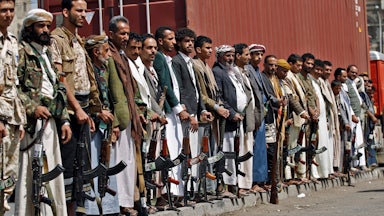When they were being bombed by Saudi Arabia with the help of U.S. intelligence and American-made weapons for the better part of the last decade, commentary on the Houthis among the foreign policy elite ranged from concern over the war’s humanitarian consequences to sharp criticism of the group’s governing practices and its loose ties to Iran. But now that the group has been subjected to three weeks’ worth of direct American airstrikes and redesignated as a terrorist organization, the commentary has taken a notably dark turn—to insidious misrepresentations and outright hostility.
While the Houthis have stated plainly and repeatedly that their attacks on shipping vessels in the Red Sea since November are motivated by their desire to pressure Israel to end its genocidal war in Gaza, several centrist and right-wing analysts have gone to elaborate lengths to ignore and minimize Ansar Allah’s pro-Palestine motivations. Instead, these commentators contend their actions are only being carried out to further the movement’s domestic goal of bolstering its claim to be the legitimate government of Yemen—ignoring the fact that Ansar Allah (the official name of the Houthis) has all but won this status after surviving a decade of siege warfare and aerial bombardment.
Israel’s onslaught, these analysts argue, provided the pretext or “Trojan horse” through which the Houthis could provoke U.S. bombing, turning them into “the victim-heroes, the heroic martyrs” worthy of mass sympathy and support across Yemen and the broader Arab world. “Their leadership will have calculated, correctly, that a Western attack on Yemen will only increase local and regional support for their efforts,” one commentator wrote. By enabling the Houthis to “galvanize domestic support that had been in decline,” direct military response from Washington is their “most cherished aspiration” and “exactly what the Houthis wanted and prepared for.” Or as Yemen scholar Gregory Johnsen likes to say, “War is good for the Houthis.”
The problem with this analysis is that the existence of domestic motivations for the Houthis does not preclude genuine solidarity with Palestinians. In this context, disconnecting Ansar Allah’s actions from Israel’s Gaza war only serves to undermine legitimate resistance to what the International Court of Justice has ruled could plausibly be a case of genocide.
Focusing on Yemen’s internal politics is “desperate and partisan” and “diverts world attention from Gaza,” Isa Blumi, author of Destroying Yemen, told The New Republic. “It is wise to link their efforts to almost 10 years of the same run of accusations, resorting to insults and claims of double standards,” he said of those emphasizing the movement’s domestic goals.
Similarly, belittling Ansar Allah’s Palestine solidarity misrepresents it as some form of shrewd opportunism—a way to appeal to the mass pro-Palestine sentiment in Yemen and across the Arab world. Support for the Palestinian cause is, in fact, foundational to Ansar Allah’s movement. Regardless of the positive impact its actions have had domestically, its pro-Palestine position is a “deep belief,” Helen Lackner, author of several books on Yemen and Saudi Arabia, told The New Republic. Ansar Allah’s leaders and members “are profoundly and deeply committed to Palestine and seriously distressed at the injustice Palestinians have suffered over the decades,” she said. “The leadership also considers the issue of Palestine-Israel its main foreign policy, alongside being anti-U.S.” In this way, Ansar Allah is following a long tradition of Palestine solidarity among various Yemeni governments since Israel’s creation in 1948.
Another way to evaluate Ansar Allah’s claims is to look at the material effects its Red Sea disruptions have had on Israel and its war on Gaza. If its actions were purely symbolic, the charge of opportunism could be plausible, regardless of the movement’s deeply held beliefs. But the Houthis are actually imposing real costs.
The economic impact on Israel itself appears noteworthy but rather minimal. Although the Eilat port on Israel’s southern border experienced an 85 percent drop in activity by late December, this port, which mostly brings in potash (an ingredient in fertilizer) and Chinese electric vehicles, “pales in size compared to Israel’s Mediterranean ports in Haifa and Ashdod which handle most of the country’s trade” and whose activity seems uninterrupted, Reuters reported. “Red Sea shipping disruption, and even some shippers declining Israeli cargo, will not bring Israel to its knees economically,” supply chain expert Brad Martin told Al Jazeera. This economic pressure is simply far too insignificant to force Israel to make any concessions.
The global effects of Ansar Allah’s Red Sea disruptions, however, might be more impactful precisely because of their ability to provoke Israel’s main backer, the United States. While the Houthis only initially targeted ships owned by or bound for Israel, they have expanded their attacks to include U.S.- and U.K.-linked ships after those countries began airstrikes.
Most of the world’s largest shipping firms have consequently stopped sending carriers through the Red Sea, through which 12 percent of all global shipping and 30 percent of manufactured goods pass. By one estimate, at least 90 percent of container ships are rerouting around the southern tip of Africa, adding on average 10 days of travel and $1 million of fuel. Traffic has almost halved in the Suez Canal, whose fees comprise 10 percent of Egypt’s budget and provide it scarce foreign currency. As a result, shipping prices have skyrocketed, though not nearly as much as during peak Covid-related supply chain disruptions. Insurance premiums for ships still traversing the Red Sea have also jumped dramatically.
While the extent to which consumer prices will be affected is still unclear, the longer shipping is disrupted, the greater the potential is for slowing down the pace at which global inflation is currently declining. As far as America’s interests are concerned, about 20 percent of all shipping bound for its East Coast and about 20 percent of imported clothing and shoes pass through the Red Sea.
Direct economic impact aside, Washington’s real interest can be found in its role as global hegemon. A central pillar of U.S. global power is the Navy’s command of the seas. According to the Center for Global Development, the U.S. spends nearly $60 billion annually on the protection of sea lanes alone, more than the entire military budget of most countries. So when Ansar Allah disrupted shipping in a major artery of global trade, it’s no surprise that the U.S. intervened as the defender of global capital.
With Washington as the primary target, Ansar Allah may be hoping that over time its attacks might compel the Biden administration to pressure Israel to rein in its war on Gaza. On this reading, the Houthis’ actions in the Red Sea could be analogized to a sympathy strike, insofar as costs are imposed on a third party to provoke it into pressuring the offending party. Biden, a committed Zionist, would prefer to avoid dealing with Israel to get the Houthis to stop. His first choice has been to try to reduce the Houthis’ offensive capacity with repeated airstrikes, a move that has cost his administration very little, beyond inciting a few lukewarm proceduralist complaints over war powers from members of Congress.
The problem is that no one, including Biden himself, thinks that these strikes have been working. The administration is reportedly “crafting plans for a sustained military campaign” with “no end date” in mind. What that will achieve is unclear. But if Ansar Allah’s ability to deter shipping in the Red Sea survives more American bombs, and if the rerouting of shipping continues to impose real costs, the Biden administration could begin to feel that it has no choice but to change its approach toward Israel’s war. The recent ruling from the International Court of Justice will only help in this effort.
For the commentators who view Ansar Allah as domestically motivated, this chain of events is out of the question. If the Houthis are primarily concerned with legitimating their rule, then an end to the bloodbath in Gaza shouldn’t stop them from disrupting shipping in the Red Sea. According to Yemen scholar Gregory Johnsen, the Houthis “can’t be deterred,” not because they are committed to supporting the Palestinian cause, but rather “because they want this conflict, for both regional and domestic reasons.” The Houthis “have no real reason to stop,” Middle East scholar Elisabeth Kendall argued, seemingly oblivious to the possibility that a permanent cease-fire in Gaza might do the trick.
Two fellows at the American Enterprise Institute went so far as to advocate in The Wall Street Journal that the Biden administration “take a strategic approach to Yemen and the Houthis—namely, stop them from winning the civil war,” which the Houthis have already effectively won. The authors urge Washington to provide “military support to the Yemeni government,” by which they mean the Presidential Leadership Council, a heavily divided body that has virtually no popular support among Yemenis, created by the very rival Gulf powers vying for control over Yemen’s affairs that failed to defeat Ansar Allah in their decade-long war. The Houthis now rule over about two-thirds of Yemen’s population.
Even Ben Rhodes, a top foreign policy official in the Obama administration who has finally come to view U.S. support for the Saudi war against the Houthis as a “huge mistake,” thinks that the solution to the Red Sea crisis lies in ending Israel’s war on Gaza. Those who emphasize Ansar Allah’s domestic motivations should follow his lead.
With its provisionally successful lawsuit against Israel last month, South Africa showed the world what true solidarity with Palestine looks like. By disrupting shipping in the Red Sea, and hence imposing real costs on Israel’s backers, the Houthis—whatever their domestic motivations—are playing their part too. Attempts to belittle their solidaristic intentions are serious moral failures and obstacles to justice.










